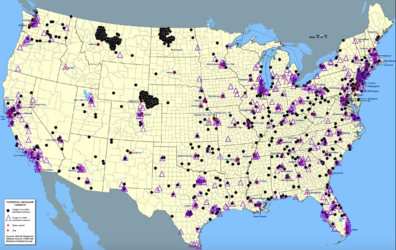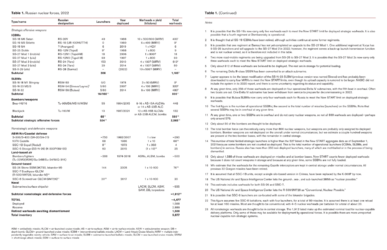- Joined
- Sep 26, 2018
difference is that hurricanes are regionally limited, and society outside the region remains intact which enables quick help and rebuilding afterwards
with a major nuclear exchange, you'd have nation wide anarchy as the entire central government is obliterated and infrastructure is destroyed everywhere at the same time. no power anywhere because the grid is in ruins, no communications, no supply chains, etc
I don't think so. Central government and the military would survive at least in some capacity but local government would be probably okay for the most part. Infrastructure in places actually hit would be destroyed but anywhere even a few miles away from the blast zone would be relatively fine. If a W76 was detonated in downtown New York then people living in Jersey City would be mostly fine, some blast damage but most structures would survive. Now that's "only" a 100kt nuke but if we did the same with a W59 (1Mt) then people in Newark would be in the same situation. The death toll and potential clean up in these situations have more to do with building and population density, the lower it is the better off you are.

That's just one nuke and most modern ICBMs carry MIRVs so one missile can hit a target multiple times over a greater area and if you're launching a nuke at a target you might as well launch more than one. The issue is that no one has enough nukes ready to destroy every military target and hit every urban population center at the same time. A quick google search says that the about 80% of Americans live in urban areas. The US has 19,495 incorporated cities, towns and villages, most of which have less than 5,000 people in then and only 10 above 1 million. With 310 cities have populations of about 100,000 or more. Lest say you're China, you've got about 500 nuke. In a war with the US you have to chose, you can attack population centers or military targets, you can't do both. You also can't annihilate every city outright, you just don't have the numbers.

This is a map of potential nuclear targets in different scenarios, looks pretty bleak but remember that those marks aren't to scale. You'll notice that outside of missile launch facility's most rural areas are better off, the people living in those areas have a pretty good time as they have much better access to food and water and any damage to infrastructure will be less felt and more easy to address, thanks in part to there just being more space to clear rubble or fight fires. That's a lot of people dead but nukes don't destroy everything, reinforced concrete structures would (outside of a direct hit) still be standing. That's bridges, dams, apartment blocks, hospitals and everything else you can think of. There's still going to be damage from thermal radiation, fires and the blast but as long as it's not on your head (or close to it) then your bigger worry is the radiation and supplies. Various US departments like the DOE, CDC and FEMA stockpile food, water, medical supplies, fuel, generators and even industrial minerals like lithium. There's not enough to go around but they are somewhat prepared.

There's some question of what a "full exchange" means, the enemy probably can't launch thousands of nukes at the US (nor could the US for that matter). Russia posses a "nuclear triad" mean they can launch form land, sea and air. Russia supposedly has 68 heavy bombers each of which can carry up to 16 AS-15 missiles, or roughly 700 nuclear warheads. They have 11 SSBNs that can carry up to 16 SLBMs with a total of 624 nuclear warheads. Russia has roughly 306 strategic ICBMs that can carry up to 1,185 nuclear warheads. All those numbers are just theoretical totals but are limited by treaty and budget, in terms of ready warhead heads then they have an estimated 1,588 ready. Not every ICBM or SLBM will launch thanks to failures and I have real doubts abut the air wing. So your probably looking at little under that number of warheads in the air. That's not enough to hit every major population center or military target to completely destroy them.
In theory the US has some capability to intercept an incoming strike from air, land and sea. ICMBs travel on a predictable trajectory, that means you can make estimates on where it will be in a given time frame. The US has early waring stations all over the world (Russia especially, thank you Cold War) and tracks Russian subs. This gives the US time to at least try to intercept some of those missiles. Organizations like the MDA (Missile Defense Agency) could probably protect US the pretty well from Iran or North Korea and anyone one with a small number of warheads. The issue here is the Russia (and China in the future) has a lot of nukes (notably MIRVs) that could be used. You could use nukes as a anti ballistic missile system (shaped nuclear charge are based) but they've been limited since the 1972 with the ABM Treaty.
Society is going to face big changes in a full exchange scenario but I don't think everything will go to shit everywhere at once. Most of the modeling for this comes from natural disasters but I think that's somewhat flawed. Dealing with something like a massive hurricane doesn't just fuck everything for an hour or a day, it does it for weeks, months and even years, over a much greater area than any nuke could hope to match. It doesn't really matter in the moment if a nuke is dropped on your city (as long as your not in the fire ball or thermal zone that is) or it's hit by a powerful hurricane. You'll still have to deal with power outages, supply shortages and infrastructure damage but the people 10 miles away from the worst of the damage are better off in the nuke scenario than a hurricane. Odds are your house is still standing that far away with a nuke something that can't be said for the hurricane. I do think we also have to take into account the type of people hit by these natural disasters, it's sad to say but I think that the mostly poor blacks in New Orleans aren't going to react like white middle class America will.
Fundamentally, a lot of people are going to die in a nuclear war and it's going to suck for a long time but I don't agree that everyone will just go full Mad Max at the drop of a hat. Yes we very dependent on infrastructure and supply chains but depending on who we are fighting, they might not have the numbers of nukes to pull that kind of destruction off. MAD doesn't need complete annihilation to work, in a war with Russia or China you have to ask yourself two questions: are you willing to kill millions of American's (even if most survive) to "win" a war? Are you wiling to lower the living conditions of even more people to basic survival?


